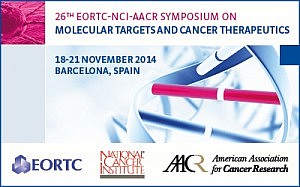Agios IDH1 Inhibitor AG-120 shows promise in AML $AGIO
 The annual Symposium on Molecular Targets and Cancer Therapeutics jointly run by the EORTC, NCI and AACR (aka “the Triple meeting”), starts tomorrow in Barcelona (Twitter hashtag #ENA2014).
The annual Symposium on Molecular Targets and Cancer Therapeutics jointly run by the EORTC, NCI and AACR (aka “the Triple meeting”), starts tomorrow in Barcelona (Twitter hashtag #ENA2014).
This makes it a particularly busy week on the conference calendar as we segue from immunotherapy at SITC to Molecular Targets, not to mention the start of our previews on hematologic malignancies at the American Society of Hematology (ASH) coming up fast!
The Triple symposium alternates between the US and Europe. In case you missed it, here’s a link to our extensive coverage from last year’s Boston Molecular Targets Symposium that we attended.
This year in Barcelona, one of the highlights is the presentation of the latest clinical data for the phase 1 trial of AG-120 (Agios), an inhibitor of the IDH1 enzyme.
As the abstract that will be presented tomorrow by Daniel Pollyea, MD (University of Colorado, Denver) notes, “Cancer metabolism represents an emerging field of novel cancer target discovery.” Along with epigenetics, it’s an exciting area that we are actively following. For years metabolism has been promising to breakthrough with new ideas that move the needle in clinical research but few have lived up to the lofty expectations, with one exception.
We first wrote Agios back in 2012, when they showed that that mutations of the metabolic gene IDH1 were consistent with that of a cancer causing oncogene in glioblastoma.
Then at ASH 2013, we heard the preclinical data for AG-221 using IDH2 mutant acute myeloid leukemia (AML) xenografts and interviewed the Agios CEO, Dr David Schenkein. The story for AG-221 continued in a positive vein with early clinical data at AACR and ASCO earlier this year. You can read more in the related posts we’ve highlighted at the end of this article.
Tomorrow at EORTC-NCI-AACR Molecular Targets in Barcelona we will hear about the preliminary results for the phase 1 trial of AG-120 in patients with advanced hematological malignancies including those with relapsed or refractory AML, myelodysplastic syndromes (MDS) and elderly untreated AML that harbor an IDH1 mutation.
Subscribers can login or you can sign up to read additional commentary.
This content is restricted to subscribers